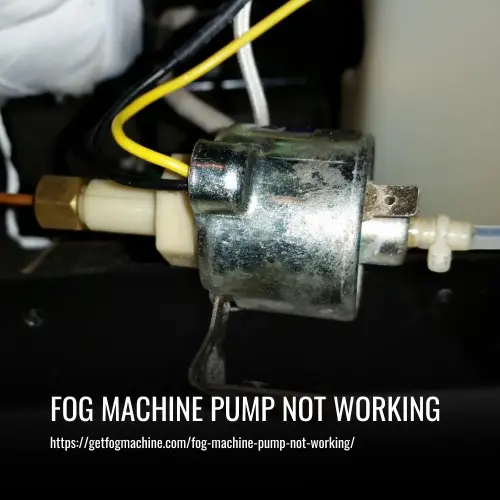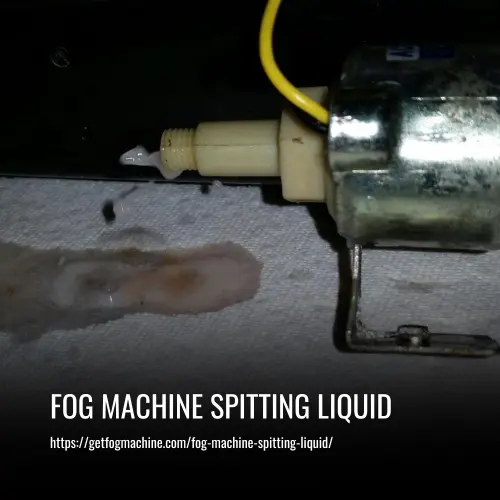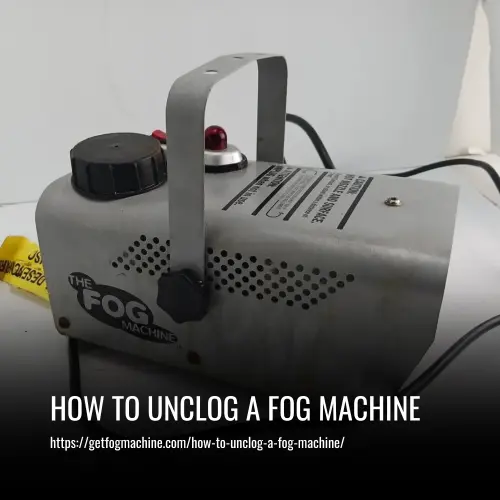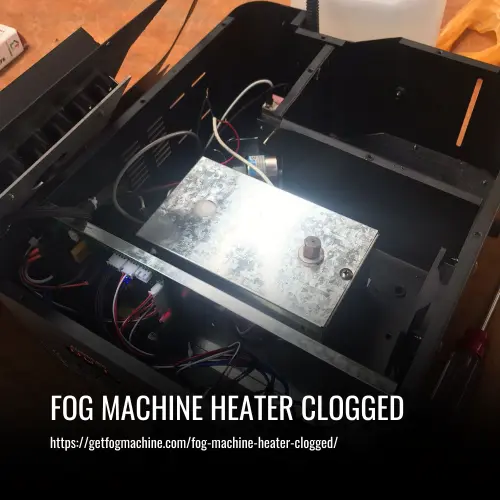How to Clean Fog Machine Residue: A Step-by-Step Guide
This post contains affiliate links. As an Amazon Associate, we earn from qualifying purchases.
To clean fog machine residue, start by taking the machine outside to avoid spreading any residue indoors. Empty the fluid tank and remove any remaining fog fluid. Mix a solution of equal parts white vinegar and water, then use a clean cloth or sponge to wipe down the inside and outside of the machine, paying particular attention to the output nozzle.
Rinse the machine with distilled water to remove any vinegar residue. Finally, rinse the entire machine with clean water and allow it to dry completely before storing or using it again. Regular cleaning of your fog machine will prevent clogs and ensure proper performance.
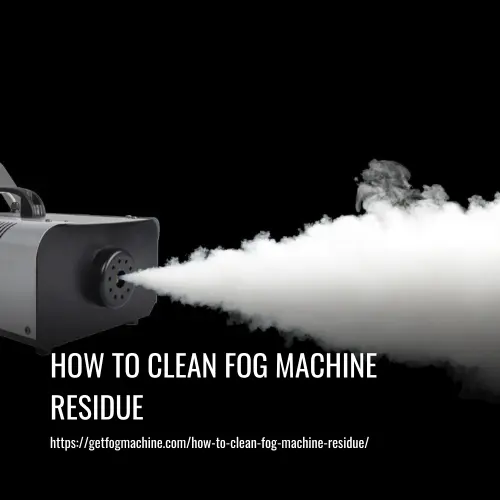
What You Will Need To Clean Fog Machine
To clean fog machine residue, you will need the following materials:
- White vinegar
- Water
- Spray bottle
- Lint-free cloth
- A soft brush (optional)
How to Clean Fog Machine Residue: A Step-by-Step Guide
Cleaning fog machine residue is an important step in maintaining the performance and longevity of your fog machine. Here’s a straightforward guide to help you eliminate residue and keep your machine running smoothly.
Step 1: Take the Machine Outside
To prevent the vinegar smell from lingering indoors, take your fog machine outside for cleaning. If you don’t have outdoor space, open a window or door for ventilation. Ensure you have access to an outdoor electrical outlet or use a long extension cord.
Step 2: Empty the Tank
Before starting the cleaning process, empty the fog machine’s tank of any remaining fluid. You can either save it for reuse or dispose of it following local regulations.
Step 3: Mix the Solution
In a spray bottle, mix equal parts white vinegar and water. If your tap water is hard, use distilled water to prevent mineral deposits. Tap water can leave spots on your fog machine, so distilled water is recommended.
Step 4: Spray the Solution
Generously spray the fog machine with the vinegar solution, covering all sides, including the bottom. Let the solution sit on the machine for at least 15 minutes, allowing the vinegar to break down the residue.
Step 5: Rinse with Distilled Water
After the vinegar solution has sat for 15 minutes, rinse the fog machine thoroughly with distilled water. You can use a spray bottle or a garden hose for this step. Ensure all traces of the vinegar solution are removed.
Step 6: Dry with a Lint-Free Cloth
Once rinsed, use a lint-free cloth to wipe down the exterior of the fog machine. A soft brush can be helpful for reaching any hard-to-clean areas. If stubborn residue remains, spray the affected spots with the vinegar solution and let it sit for a few more minutes before wiping clean. Allow the machine to air dry completely before storing or using it again.
By following these simple steps, you can effectively clean fog machine residue and ensure optimum performance for future use.
How to Clean Other Parts of the Fog Machine
Cleaning the tank and exterior of your fog machine is important, but there are other parts that also require regular cleaning to ensure optimal performance. Here are steps to clean other parts of the fog machine:
Cleaning the Nozzle
The nozzle is a crucial part of the fog machine that requires regular cleaning to remove residue buildup. Here’s how to effectively clean the nozzle:
1. Prepare a Cleaning Solution: Mix equal parts distilled water and white vinegar in a container. This solution will effectively break down the residue on the nozzle.
2. Soak a Lint-Free Cloth: Take a lint-free cloth and soak it in the vinegar mixture.
3. Wipe Down the Nozzle: Gently wipe down the nozzle with the damp cloth, ensuring that all residue is removed. For stubborn residue, use a soft brush to scrub the surface.
4. Rinse with Distilled Water: Once the residue has been loosened and removed, rinse the nozzle with distilled water. This will help remove any remaining vinegar mixture and residue.
5. Allow to Air Dry: After rinsing, let the nozzle air dry completely before reassembling it back onto the fog machine.
Cleaning the Pump
The pump is responsible for circulating the fog machine fluid, and it can become clogged if not cleaned regularly. Follow these steps to clean the pump:
1. Remove the Pump: Carefully detach the pump from the fog machine according to the manufacturer’s instructions.
2. Soak in Vinegar Solution: Place the pump in a container filled with a vinegar solution, ensuring that it is fully submerged. Allow it to soak for at least 15 minutes to loosen any residue.
3. Rinse with Distilled Water: Thoroughly rinse the pump with distilled water to remove any vinegar residue and ensure proper cleaning.
4. Air Dry Completely: After rinsing, let the pump air dry completely before reinstalling it back into the fog machine.
Testing the Fogger Fluid
Before using the fog machine again, it is essential to test the fogger fluid to ensure proper cleaning and functionality. Here’s how to test the fluid:
1. Create a Testing Solution: Mix a small amount of water and vinegar in a cup.
2. Pour the Mixture: Pour the testing mixture into the fog machine’s fluid tank.
3. Turn on the Machine: Switch on the fog machine and observe the fog output. If the fog produced is clean and free from residue, it indicates that the machine is clean and ready for use.
4. Repeat if Necessary: If the fog output still contains residue, repeat the cleaning process until the fogger fluid comes out clean.
Regular cleaning and maintenance of the nozzle, pump, and fogger fluid will ensure the longevity and optimal performance of your fog machine.
How Often Should You Clean Your Fog Machine
To ensure optimal performance of your fog machine, it is recommended to clean it after every 80 hours of use. However, if you frequently use your fog machine or notice a decrease in fog output, it may be necessary to clean it more often.
Regular cleaning helps remove residue buildup in the nozzle and pump, which can affect the quality of the fog produced. By cleaning your fog machine regularly, you can maintain its efficiency and prolong its lifespan for continued use in various professional and party settings.
What Will Happen if You Do Not Clean Your Fog Machine
If you neglect to clean your fog machine, you may encounter several issues that can affect its performance and lifespan. It is important to properly maintain your fog machine to avoid the following problems:
1. Clogging of the Fluid Heating Chamber
The fluid heating chamber is responsible for vaporizing the fluid to create the fog effect. Over time, residue can build up in the chamber, leading to clogs. This will prevent the fluid from vaporizing properly and cause the machine to overheat and eventually break down.
2. Loss of Performance
Residue can also accumulate in the output nozzle of the fog machine. This can result in a decrease in the fog output, reducing the machine’s performance and effectiveness. If the nozzle remains clogged, it can eventually lead to a breakdown.
3. Overheating of the Heating Element
The heating element in the fog machine helps to heat the fluid and create the fog effect. If residue builds up on the heating element, it can hinder proper heat dissipation. This can cause the machine to overheat, potentially damaging the heating element and leading to a breakdown.
4. Increased Maintenance Costs
Neglecting to clean your fog machine regularly can result in more frequent part replacements due to accelerated wear and tear. This leads to increased maintenance costs and potential downtime if the machine breaks down during an event or performance.
To avoid these issues, it is crucial to clean your fog machine regularly. Follow the manufacturer’s instructions for cleaning and use a recommended cleaning solution, such as a vinegar mixture or a specialized fog machine cleaner.
FAQs
Yes, fog machines do leave a residue. Smoke particles settle on all surfaces and may leave a residue.
Yes, you can use other cleaning solutions, such as alcohol or dish soap. However, vinegar is the most effective solution for cleaning fog machine residue.
To test the fogger fluid, mix a small amount of water and vinegar in a cup. Pour this mixture into the tank and turn on the machine. If the mixture comes out clean, the machine is ready to use. If not, repeat the cleaning process.
Yes, vinegar is a safe and effective cleaning solution for fog machines. However, rinse the machine with distilled water after using vinegar.
It is important to clean your fog machine because it will prolong the life of the machine and save you money in the long run. A clean fog machine is also less likely to break down or experience problems.
To clean a fog machine after use, fill the tank with a solution of 50/50 water and vinegar. Power up your fogger in a well-ventilated area, let it heat up, and fog as usual. The vinegar should dissolve at least some of the impurities that are in the pump and/or heater, and the water should flush them out.
You can clean a fog machine with a mixture of water and vinegar. However, be sure to use distilled water only, not tap water. Tap water contains minerals that can leave deposits inside your machine, which will build up over time and cause problems later.
Fog smoke can be dangerous if you overheat the mixture. Overheated fog juice can cause residue and damage your machine. Additionally, over-heated fog is dangerous to breathe and can cause slip hazards. It is essential to use a high-quality fog machine and its recommended fog fluid to avoid harm to your body or the machine.
Conclusion
With these tips and tricks, cleaning fog machine residue doesn’t have to be a daunting task. By following a few simple steps, you can ensure that your fog machine continues to work efficiently and produce the perfect atmosphere for your events. So go ahead, clear away the residue, and let the fog roll in for an unforgettable experience!
When cleaning the machine, ensure that it is unplugged from the electrical outlet and at a proper temperature. Use a damp cloth to wipe down the exterior of the machine, paying special attention to the output nozzle and fluid tank. Avoid using tap water or other harsh chemicals as they can damage the machine.


